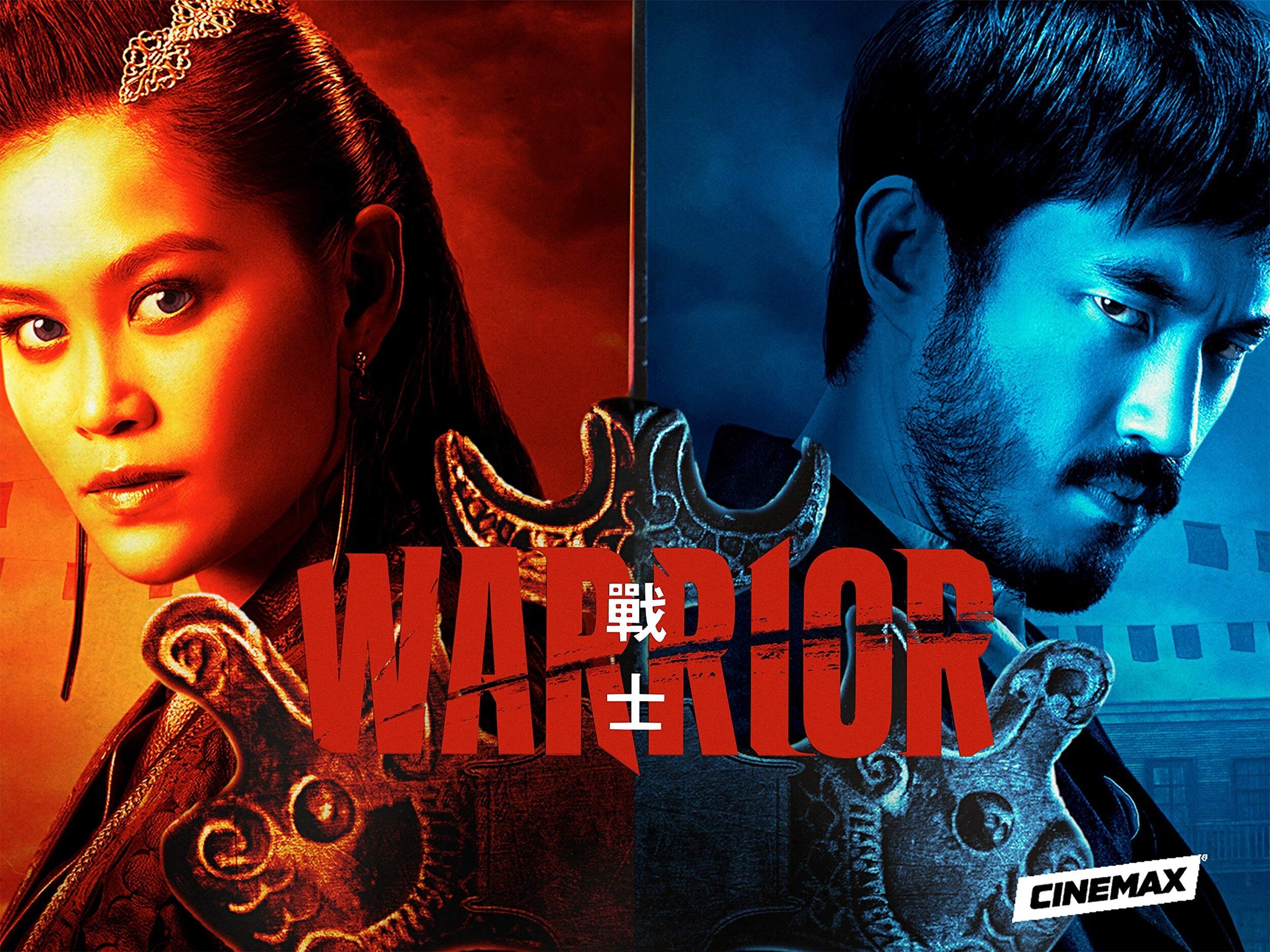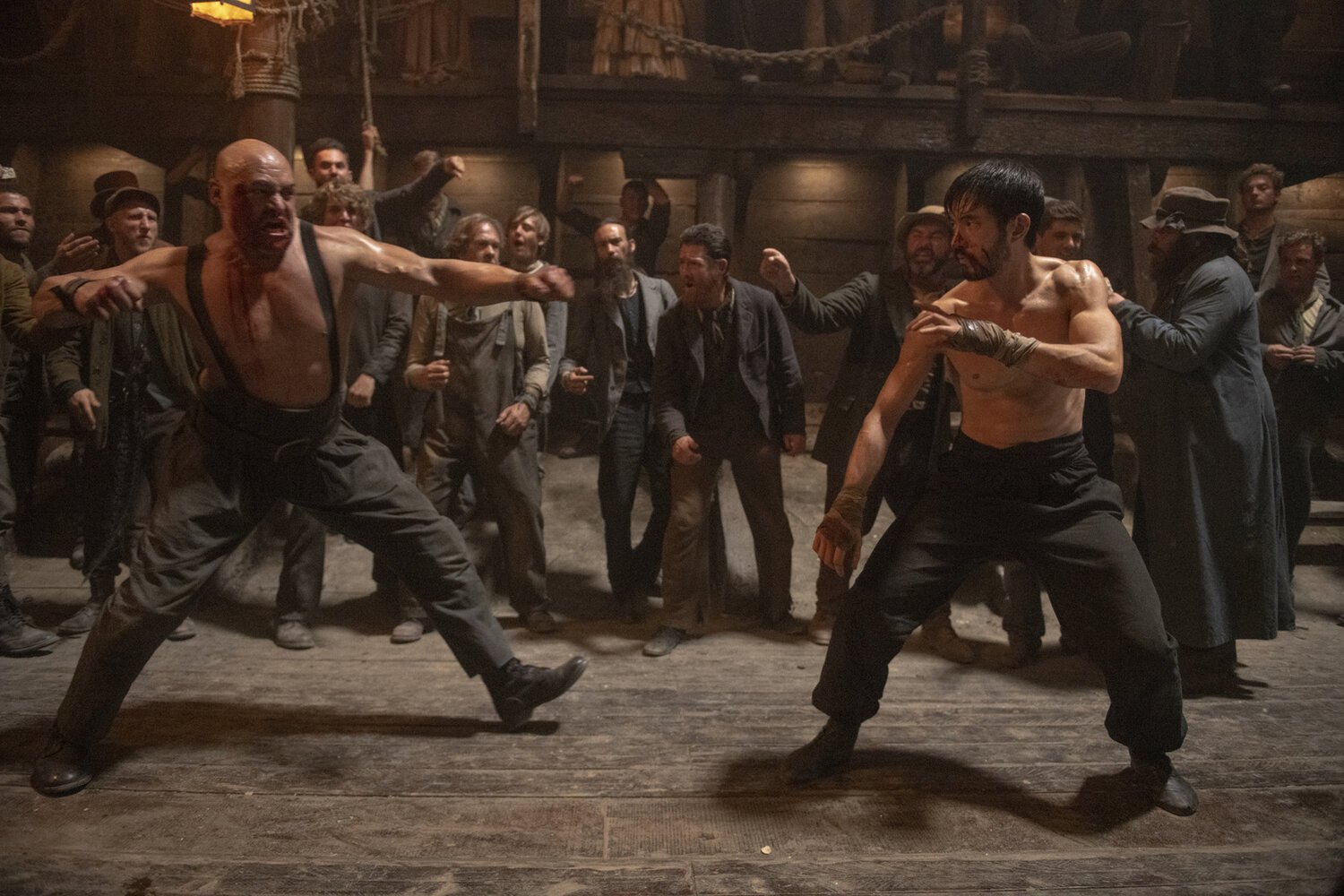Warrior, Season 2 Review: Just Whose Side are We Supposed to Be On?
Hapa Mag - DECEMBER 9, 2020
By Nathan Liu
*THIS ARTICLE CONTAINS SPOILERS
In the ninth episode of Warrior’s second season, a Chinese man named Jacob is accused of murdering his boss, the mayor of San Francisco. He tries to escape, paying a smuggler, Chao, to transport him out of the city but is betrayed when Chao and Mai Ling, the leader of one of the many gangs that rule Chinatown, sell him to the mob. Their excuse is that giving him up is for the “greater good” of their community, since it’ll draw the mob’s wrath away from them. This, of course, proves to be wrong. As soon as the angry whites have finished lynching Jacob, they storm Chinatown and proceed to murder every Asian person in sight. Men, women, children, none are spared. We see people shot, beaten with clubs, hacked to pieces with axes, and drowned. It’s very graphic and very upsetting. And while watching this sequence — which not only bears striking similarity to events from my own family’s history, but to hate crimes committed in the wake of COVID-19 as well — I finally realized what my problem with the series has been.
Photograph by David Bloomer/Cinemax
For all its noble intentions, reviving the treatment Bruce Lee pitched to networks back in the ’70s — highlighting the anti-Chinese sentiments of the late 1800s, showing Asian men as masculine and sexual — I don’t think the series can be described as “progressive.” I don’t think it’s about, or for, Asian Americans. What I mean by that is, the show isn’t about regular Chinese people. It isn’t about normal, everyday immigrants who work, raise families, and try to live good lives without hurting anyone. It’s about gangsters. The series focuses on a martial artist, Ah Sahm, coming to America to save his sister, Mai Ling, from a life of sex work. When he arrives, however, he finds that she’s become the leader of one of the gangs that rule Chinatown, and upon learning this, Ah Sahm, rather than return home, decides he should stay and join the various murderers, drug dealers, and human traffickers who are exploiting the Chinese community. And it’s these same murderers, drug dealers, and human traffickers that the series chooses to focus on. Which is a problem.
Throughout the show, white characters who are written to be racist claim that the Chinese are “bringing drugs and bringing crime.” Seems like classic xenophobia. Except that all the major Chinese characters — the ones with names, storylines, and ample amounts of dialogue — are criminals. And I mean vicious criminals. We see them import and sell drugs, pimp out underage girls, and kill people left and right. So when these white characters say things like “the Chinese are dangerous,” or “the Chinese must go,” all I think to myself is, “Yeah, racist white people, you’re absolutely right.” And bear in mind, I’m Chinese American. My family has experienced the exact kind of racism that this show is ostensibly trying to comment on. My great-grandfather, JS Lowe, was born in San Francisco in the late 1800s, the same time period in which this show is set. He chose to immigrate to China, a country he’d never been to, because he figured whatever was there had to be preferable to the racist hellhole he was living in. I should hate these white characters on general principle, given my own family’s history. And yet, because of how the Chinese are portrayed in the show, I found myself agreeing with, and even rooting for, the white characters.
Photograph by David Bloomer/Cinemax
Now Warrior could easily have mitigated this negative portrayal by showing us regular Chinese people, as well as gangsters. And it does, sort of. We see Chinese civilians working as merchants, laundromat owners, and farmers, in the background. These regular people don’t have names or any dialogue. Even Jacob, the man who gets lynched, can be classified this way because of how little he says or does throughout the first two seasons. I legitimately forgot that the mayor character had a Chinese butler named Jacob until the episode where he’s killed. That’s not good. And it’s these same nameless, voiceless, regular Chinese who get slaughtered by the mob. This is not a story about them, or, by extension, actual Asian Americans. It’s about Asian criminals who, appallingly, are framed as the heroes. Seriously, when the lynch mob attacks Chinatown, it’s the gangsters who defend it. The nameless civilians paint a mural in their honor, not seeming to realize these criminals were only protecting their turf, and were, in fact, the ones who brought the destruction down upon them. Likewise, the character of Ah Toy, based on a real-life madame, is portrayed as a guardian angel in the second season, rescuing Chinese girls from sex work and killing racists with a sword. This is a far cry from the real woman, who was vicious, and who, like other madams of the time, was known to buy and sell girls under the age of 12. And the messed up thing is, the show knows this. In the first season, we see Ah Toy cut one of her sex worker’s tongues out. But now, all of a sudden, she’s Mother Teresa? Ugh.
Lest you think my problems with the series are purely moral, think again. The bad writing in this series makes its questionable representation unavoidable. See, if the characters had been more interesting, the dialogue sharp, and the plot made sense, I might have been able to overlook the glorification of Asian criminals. After all, one of my favorite films of all time is Better Luck Tomorrow, a movie about Asian American teenagers who turn to petty crime as a means of escaping their stifling lives. In that film, we see where each of the protagonists is coming from, and understand, if not condone, their actions. Unfortunately, this series — despite being produced by Better Luck Tomorrow’s director, Justin Lin, and featuring one of its stars, Jason Tobin — has none of the same pathos.
Characters and plot threads are introduced in this season, only to be dropped seconds later. The character Chao is shown to have a mixed-race child. Seems like it could be interesting, except Chao sends her away from San Francisco almost immediately after she is introduced, removing any potential for drama. Similarly, both Ah Sahm and Mai Ling are written to be mixed — their grandfather was white — but no one ever treats them differently. Or take the character of Miss Vega. She owns a bar where Ah Sahm goes to fight, and eventually recruits him to compete in a martial arts tournament. This, as we find out, is a front for her true purpose, killing the tournament’s owner, who stole her family’s land years ago. She succeeds, and is murdered almost immediately afterward. What does any of this have to do with the main plot, the war between the Tongs, the police, and the Irish? Nothing. Absolutely nothing. If you removed her character, and her five-episode arc, from the show, the plot would be affected in no way whatsoever.
And if the show is guilty of building things up for no reason, it’s equally guilty of throwing things in without any preamble. Take Jacob and the death of San Francisco’s mayor. It’s not built up to at all. In the eighth episode, the mayor, who’s drunk, hits his wife, Penny. Jacob defends her and hits the mayor with a poker, accidentally killing the man. Like I said, Jacob has not been a prominent character throughout the season. To have him suddenly appear and do this feels as though the writers recognized the story wasn’t going anywhere, and decided to arbitrarily toss this big event in.
Photograph by David Bloomer/Cinemax
Now at this point I should say that I don’t believe any of the stereotyping or negative messaging is intentional. I’ve met the show’s creators — Jonathan Tropper, Justin Lin, and Shannon Lee — and even interviewed the star, Andrew Koji. Everyone has made it clear that this was a program meant to celebrate Asian American history, comment on past injustices, and honor Bruce Lee’s legacy, which is great, but I don’t think this show does that. It’s far too anachronistic with its costumes, language, and wardrobe to work as historical fiction, and it’s not well-written enough to achieve its goals. By focusing on, and even glorifying, Asian criminals, the show loses any credibility when it comes to social commentary. In the same episode as Jacob’s lynching and the destruction of Chinatown, Ah Toy and Mai Ling have a conversation behind closed doors. During this conversation, Ah Toy expresses admiration for Mai Ling’s leadership, saying, “You went from a warlord’s wife to a warlord yourself.” Are you kidding me? Lady, Mai Ling is the reason Chinatown is on fire right now. Don’t encourage this shit. The show’s excuse for its tacit support of Mai Ling is the fact that she’s a woman who rose to power after being abused by her husband. What does that have to do with anything? How does one person treating you badly give you the right to murder, torture, and extort people — all of which we see Mai Ling do?
Again, I know the creative team’s intentions were good. I’m always happy to see Asian American stories get told and for Asian actors to work in Hollywood. But not like this. If they do wind up making a third season, I want them to focus on regular Chinese people. I want audiences to see that these gangsters were, in many ways, as bad for Asian immigrants as racists. I want pathos. As an Asian American customer, I’m done with accepting bad representation in my entertainment. And as an Asian American screenwriter, I’m going to learn from Warrior’s mistakes and tell stories that are truer to who we are. Because as Lulu Wang so eloquently put it, “Being grateful has never moved the needle forward. I think it’s time to stop being so damn grateful for being thrown a crumb when we could have the entire loaf of bread.”
Nathan Liu is a screenwriter, playwright, and true blue pizza addict. Spending most of his early life in Germany, and being part Chinese on his father's side, Nathan was exposed to many different cultures growing up. His experience in film and theater includes penning scripts for Pixeldust Studios, and writing the play "Christmas By The Pond," which was awarded "Best One Act" at the Broke People Play Festival. Follow him on Twitter @TheNathanLiu, and read his blog, Liusviews.wordpress.com.





